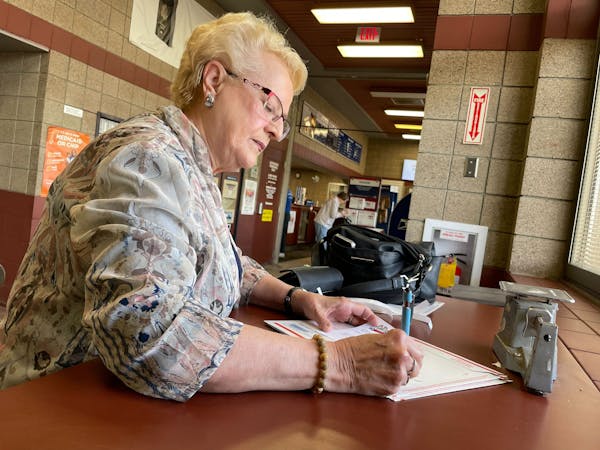GREENVILLE, Miss. - James "T-Model" Ford was waiting in the afternoon shade of his front yard, sipping Jack Daniels with a splash from a white plastic cup.
Which was fitting, because I had listened to his CD, "Jack Daniel Time," on the drive down Hwy. 61 from Clarksdale.
At 88, Ford moves slowly, so he asked me to fetch his guitar and amplifier from the back of the van in the carport. Inside the tidy house, Stella, his common-law wife -- "Five marriages is enough," he said -- gave me a power cord and pointed into the bedroom.
Plugged in, Ford began playing and singing. A late bloomer, he picked up the guitar at age 58. Ford isn't quite as accomplished as other Mississippi legends such as Robert Johnson, Charlie Patton, Muddy Waters, B.B. King, Albert King, Son Thomas, Howlin' Wolf, Jimmy Reed, Pinetop Perkins, Ike Turner, R.L. Burnside and John Lee Hooker. But his raw, driving guitar and growling vocals were pure down-home Delta blues.
"I got my mojo workin', jes won't work on you."
•••
The epicenter of the blues was, and is, Clarksdale -- one reason actor Morgan Freeman named his club there the Ground Zero Blues Club. Ironically, Clarksdale was home to the Hopson Plantation, which in 1944 produced the first cotton crop with mechanical equipment. That led to the Great Migration of blacks from the South in search of jobs in northern cities. They traveled up Hwy. 61, the "Blues Highway," taking their music to St. Louis, Memphis and Chicago. Somewhere along the way, the blues gave birth to rock 'n' roll.
Rave reviews about the B.B. King Museum, which opened in Indianola in September, inspired me to head out on a road trip through Mississippi, which is busy setting up highway markers for a Blues Trail. But I didn't want to make a dead-man's tour of markers, museums and gravesites. I wanted live legends, "real-deal" Delta bluesmen, as Roger Stolle calls them.
Stolle owns Cat Head's Delta Blues & Folk Art in what is left of downtown Clarksdale. In the spring of 2008, he teamed up with Jeff Konkel, who runs Broke & Hungry Records in St. Louis. They roamed the Delta, followed by engineer Bill Abel in a Volvo turned into a mobile recording studio and cinematographer Damien Blaylock. The result is a CD and DVD titled "M for Mississippi," showcasing the state's bluesmen performing at house parties, juke joints and in their living rooms and front yards.
Stolle, a white guy who left a job in marketing, moved to Clarksdale in 2002 in search of the blues.
"Of the real-deal solo blues musicians, still active, there are probably about 15, not counting bands," Stolle said. "The blues will never go away."
•••
In the shade of his front yard, with Stella watching from the screened porch, Ford would have played all afternoon, but stopped to talk.
"I was born in Forest, Miss., picked cotton, plowed mules, worked in a sawmill," he said. "Can't read, can't write, never been to school a day in my life. Taught myself how to play the guitar. When I was 18, guy tried to kill me. I killed him and went on the chain gang in Tennessee. It didn't make a bad man out of me, made me a good man. I been quiet ever since."
Ford rattled off the names of the bluesmen who grew up around Greenville, and explained why the Delta was the source of a sound that resonated in the works of the Rolling Stones, Eric Clapton, Jimi Hendrix, Bonnie Raitt, J.J. Cale and nearly every other modern-day musician.
"The cotton fields, that's where the music came from," he said. "Chopping cotton, picking cotton, had to have a good mule to stand up in front of you. Soon, everybody be singing to chase away those blues."
•••
The Riverside Hotel, "Home of the Delta Blues," is another of Clarksdale's legends, but I almost bolted. From the outside, the place looked grungy, the door was locked and nobody answered when I followed the directions on the scrawled sign: "Top red bell to see Rat."
I was back in my car when a black pickup pulled up with Frank "Rat" Ratliff driving. He is the son of Z.L. Ratliff Hill, who in 1944 bought the two-story building that once housed the city's black hospital. Blues singer Bessie Smith died in the hospital after a car accident in 1937. Hill ran a hotel that catered to black musicians who came through town.
"Once people come in, they satisfied," Rat said as he ushered me inside. "I ain't never had anybody walk back out that door."
A corridor with a worn wood floor led by a wall of celebrity photos to rooms with doors wide open, revealing neatly made beds and the original wood dressers and nightstands. The hotel has communal bathrooms, updated and clean.
"I'm known all over the world," Rat said. "I don't do any advertising. Word of mouth sends them here."
•••
Clarksdale has two blues museums, three if you count Red's Lounge, a classic juke joint where T-Model Ford and others have recorded albums.
The centerpiece of the Delta Blues Museum is a cypress log cabin that once stood on Stovall Plantation and was part of the home of McKinley Morganfield, better known as Muddy Waters. His likeness sits inside, guitar in hand, while a video overhead shows vintage performances and homages from rockers such as Keith Richards and Bonnie Raitt. "Muddy was playing when I was plowing," said B.B. King.
The Rock 'n' Roll & Blues Heritage Museum is the pride and joy of Theo Dasbach, who first heard the blues about 50 years ago on a crystal receiver that brought Radio Luxembourg into his childhood home in the Netherlands. During a career in law, Dasbach bought every rare record, poster and piece of music memorabilia he could afford.
While the Ground Zero Blues Club is a busy nightclub, you wouldn't know Red's was even open, except for the cars parked out front. The building looks dark and foreboding, then the door opens and the music flows out onto Sunflower Avenue.
Maybe 50 customers crowd in on a good night, paying $5 and sipping 24-ounce beers, while listening to music that won't let you sit still. On two visits, I heard Robert "Wolfman" Belfour, who played a sizzling guitar and moaned the blues, and the Robert "Bilbo" Walker Blues Revue.
The second room of the B.B. King Museum in Indianola has a receipt showing that a young Riley B. King borrowed 40 cents to buy a cotton sack for picking that fall's crop. A later video shows King meeting the pope and standing before the Eiffel Tower. A whole lot of ground is covered in between, and the museum tells, and shows, it all with memorabilia and slick videos.
King gave the museum his blessing and his horde of personal items, including the entire recording studio from his Las Vegas home. Still touring at 83, he is the star of the videos, which begin with his first visit to the spot where he was born at Berclair, 16 miles east of Indianola.
Jim Abbott, a retired newspaper editor and one of the movers in creating the $14 million museum, said King returns to Indianola each June to play a concert in the town park. The museum's goal, Abbott said, is to be the southern anchor in Mississippi's Blues Trail, an attraction that will draw tourists worldwide.
"There's still too much poverty in the Delta, and a huge disparity in incomes," Abbott said. "We could use a shot in the arm."
Sign up for Star Tribune newsletters

Drone footage shows Ukrainian village battered to ruins as residents flee Russian advance
In heated western Minn. GOP congressional primary, outsiders challenging incumbent

